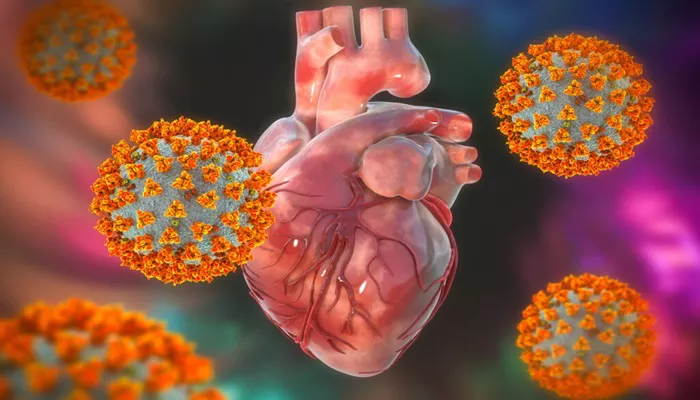The emergence of the severe acute respiratory syndrome coronavirus 2 (SARS-CoV-2) has led to a global pandemic, significantly impacting public health. While the primary symptoms of COVID-19 are respiratory, it has become increasingly evident that the virus can also cause serious cardiovascular complications, including myocarditis.
Myocarditis, an inflammation of the heart muscle, can lead to severe outcomes such as heart failure, arrhythmias, and even sudden cardiac death. Understanding how SARS-CoV-2 induces myocarditis is crucial for managing patients with COVID-19 and mitigating the long-term effects of the virus on cardiovascular health.
This article aims to explore the mechanisms through which SARS-CoV-2 causes myocarditis, the clinical implications, and the importance of early diagnosis and management. By examining the pathophysiology, risk factors, and treatment strategies, we can better understand this serious complication of COVID-19.
Pathophysiology of COVID-19-Induced Myocarditis
SARS-CoV-2 primarily enters human cells through the angiotensin-converting enzyme 2 (ACE2) receptor, which is highly expressed in various tissues, including the lungs and heart. The binding of the virus to ACE2 facilitates its entry into myocardial cells, leading to direct viral injury. This direct damage to the myocardium is a key factor in the development of myocarditis.
In addition to direct viral infection, the immune response plays a significant role in the pathogenesis of myocarditis.
Following infection, the body mounts an immune response to eliminate the virus. However, this response can become dysregulated, resulting in a cytokine storm—a hyper-inflammatory response characterized by the excessive release of pro-inflammatory cytokines. This cytokine storm can lead to further myocardial injury and inflammation, exacerbating the condition.
The interplay between direct viral damage and the immune response is critical in the development of myocarditis. Studies have shown that patients with COVID-19 can exhibit elevated levels of cardiac biomarkers, such as troponin and brain natriuretic peptide (BNP), indicating myocardial injury. The presence of these biomarkers, along with clinical symptoms, can aid in the diagnosis of myocarditis in COVID-19 patients.
SEE ALSO: What Is The Gold Standard Test for Myocarditis?
Clinical Presentation of Myocarditis in COVID-19
Myocarditis can present with a variety of symptoms, which may overlap with those of COVID-19 itself. Common clinical manifestations include:
Chest pain or discomfort: Patients may experience a sensation of tightness or pressure in the chest, which can be mistaken for typical COVID-19 symptoms or anxiety.
Palpitations: An irregular heartbeat or a sensation of fluttering in the chest is often reported by patients with myocarditis.
Dyspnea: Shortness of breath, particularly during exertion, can occur due to impaired cardiac function.
Fatigue: Patients may experience an unusual level of tiredness, which can be attributed to both the viral infection and myocardial inflammation.
Fever and malaise: Generalized symptoms such as fever and a feeling of being unwell are common in viral infections and can also accompany myocarditis.
Given the nonspecific nature of these symptoms, diagnosing myocarditis in the context of COVID-19 can be challenging.
Clinicians must maintain a high index of suspicion, especially in patients presenting with chest pain, dyspnea, or palpitations shortly after a COVID-19 diagnosis.
Risk Factors for Myocarditis in COVID-19 Patients
Several risk factors have been identified that may predispose individuals to develop myocarditis following SARS-CoV-2 infection.
These include:
Age and sex: Younger males, particularly those aged 12 to 40, appear to be at a higher risk for myocarditis, both from COVID-19 and post-vaccination. This demographic trend mirrors patterns seen in other viral myocarditis cases.
Pre-existing cardiovascular conditions: Patients with a history of heart disease, hypertension, or diabetes may have an increased risk of developing myocarditis, as their cardiovascular systems are already compromised.
Severity of COVID-19 infection: Severe cases of COVID-19 are associated with a higher incidence of myocarditis. Patients requiring hospitalization or intensive care are more likely to experience cardiac complications.
Immune response: Individuals with an exaggerated immune response to SARS-CoV-2 may be more susceptible to developing myocarditis due to the resultant cytokine storm.
Understanding these risk factors is essential for identifying patients who may require closer monitoring and intervention.
Diagnosis of Myocarditis in COVID-19
The diagnosis of myocarditis in patients with COVID-19 involves a combination of clinical evaluation, laboratory testing, and imaging studies. Key diagnostic steps include:
Clinical assessment: A thorough history and physical examination are crucial. Clinicians should inquire about symptoms such as chest pain, dyspnea, and palpitations, as well as any recent COVID-19 diagnosis.
Cardiac biomarkers: Elevated levels of troponin and BNP can indicate myocardial injury. These tests should be performed in patients with suspected myocarditis.
Electrocardiogram (ECG): An ECG can reveal arrhythmias or other abnormalities suggestive of myocarditis.
Imaging studies: Cardiac magnetic resonance imaging (MRI) is a valuable tool for assessing myocardial inflammation and damage. It can help differentiate myocarditis from other cardiac conditions.
Endomyocardial biopsy: In select cases, a biopsy may be performed to confirm the diagnosis, although this is not routinely done due to its invasive nature.
Early diagnosis is critical, as timely intervention can improve outcomes for patients with myocarditis.
Conclusion
Myocarditis is a serious complication associated with COVID-19 that can lead to significant morbidity and mortality. The interplay between direct viral injury and the immune response is central to the pathogenesis of this condition. Clinicians must be vigilant in recognizing the signs and symptoms of myocarditis in patients with COVID-19, particularly those with risk factors for cardiac complications.
Early diagnosis and appropriate management are critical to improving outcomes for affected patients. As our understanding of COVID-19 and its cardiovascular implications continues to evolve, ongoing research is essential to develop effective treatment strategies and guidelines for managing myocarditis in the context of this novel virus.

